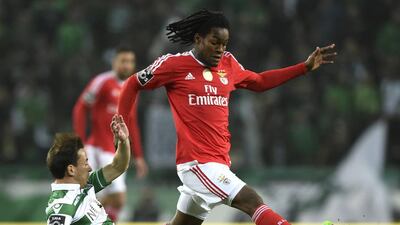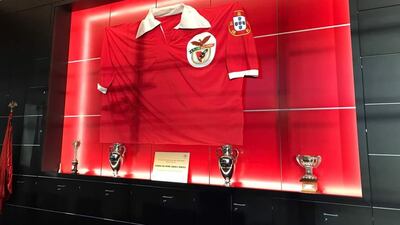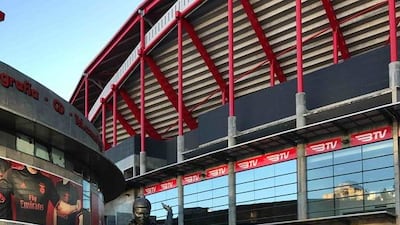Benfica play a crucial Uefa Champions League away match at Besiktas on Wednesday. The Portuguese giants are in the tightest of groups, with seven points from four games. Leaders Napoli also have seven, Besiktas six. Avoiding defeat will be the key in the stunning new BJK Inonu stadium overlooking the Bosporus, before a final home group game against Napoli.
Benfica were the best team in the world in the early 1960s, superseding the peerless Real Madrid side of the '50s. European Cup winners in 1961 and 1962, they reached three more European Cup finals in the 1960s, the side led by Eusebio the club's best ever. They also reached the final in 1988 and 1990, the five final defeats still sting.
Winning the Champions League is implausible now against clubs with far better resources, but modern day Benfica thrive. They continue to enjoy domestic success having won the last three Portuguese titles and are regular participants in the Champions League. They also trade exceptionally well, selling 13 players for €300 million (Dh1.1 billion) over the past six years alone.
Renato Sanches, a star of Portugal’s 2016 European Championship triumph, was the latest big money departure in a €32 million transfer to Bayern Munich. He followed David Luiz, Andre Gomes, Angel di Maria, Fabio Coentrao, Nemanja Matic, Bernardo Silva, Ramires, Axel Witsel, Rodrigo, Lazar Markovic, Enzo Perez and Jan Oblak out of a club where they had done so well.
"It's our core business to find the best players at an early stage," Benfica chief executive Domingos Oliveira says in an exclusive interview with The National in the Benfica boardroom where a giant replica version of the club's 1960s shirt fills one of the walls. "We try to anticipate the player's future at the early stage of their development, not only internally with our own academy but outside via our extensive network of scouts."
Benfica, whose academy won the world's best at the Globe Soccer Awards in Dubai last year, had scouts in South America long before most big European clubs, all looking for a certain profile of talent.
“We’ll not buy a player at 26 or 27, but 18 or 19,” Oliveira says. “We do this because we realised that to compete with the big clubs in Europe – and we’re a big club but not from a big country – we should develop a fourth stream to our business.”
For most clubs, the revenues streams are commercial, ticketing and media. For Benfica, trading players for profit is what they do very well.
In the case of Luiz, they sold him to Chelsea for €25 million with Nemanja Matic coming the other way, then they sold Matic for €25 million ... to Chelsea.
“Don’t remind Mr Abramovich,” Oliveira says. “Finding players while they’re cheaper allows us to sell them on as they’re moving towards the top, though there are exceptions like Renato Sanches.
“He was with us since age 10 and we saw the difficulties he had as a young boy from a very difficult neighbourhood. Then he developed as a player. We would have preferred to have sold him later, but the offer we received was so good that we had to accept it. We’re very proud of him.”
Benfica cannot compete with the riches of the big English or Spanish clubs and Oliveira appreciates that “all the big clubs in Europe know the top 50 young players in South America right now” but they accentuate their own advantages.
“The question is what are you going to offer these players in the next two to three years,” he says. “If they go to Man United or Real Madrid it is going to be difficult for them to play. If they come here they’ll be in a team where half of the players are under 22. They’ll know they have opportunities.”
Benfica are huge, but the challenges are different.
“The pressure in the biggest clubs is that you have to deliver results immediately,” Oliviera says. “Angel di Maria, Nico Gaitan or David Luiz played here for a long period but they accepted they wouldn’t play in the first team immediately. That’s more difficult to accept at the big clubs in the big countries with an expensive player.”
Working with sensible, trusted, agents helps.
“You need to have very good relations with agents like Jorge Mendes and, if the agent is honest, he’ll admit that he’ll earn less money doing a transfer to Benfica than to another big club, but he’ll also understand that for the future of the player then he should move first to Benfica,” Oliveira says. “Very often, Mendes will say, ‘It’s not yet the time to sell this player’ because he knows that player will get additional know-how if he stays.”
Benfica are glowing in their praise of Mendes and how he spots the players most likely to make it when they are teenagers. For a country of only 10 million, Portugal punches way above its demographic in the world of football. The current European champions, Portugal can also boast football's most important agent, plus Cristiano Ronaldo and Jose Mourinho, two men at the absolute top of football.
Portugal does benefit from some factors in its favour, such as cultural connections to footballer-producing countries including Brazil. Lisbon also has more direct flights to South America than any other European city.
“The shared language is extremely important for the Brazilian players – we consider them brothers – the climate and culture too,” Oliveira says. “We have several Argentine players and even though they speak a different language they find it very easy to settle.”
Scout, settle, success, sell. The Benfica model is working and on the strength of it they continue to challenge the super clubs, but it hasn’t always been so.
In 2004, the year Dominges joined, the previous Benfica president was in prison for fraud and the club was in administration. The decision in 2001 to build a new 65,000 capacity Stadium of Light when they had no money “was crazy,” says Oliviera, “even if you asked the most conservative guys. Our total annual revenues were €40 million. Today they are €250 million and profitable. And the new stadium is part of the solution.”
That is a stadium which this season sees average home crowds of 54,266 — 10,000 more than neighbours Sporting and almost 20,000 more than Portugal’s third giant, Porto. That average would put Benfica third in England and Spain, first in France and Italy. They are Champions League regulars, but they have sold too many of their best players to be contenders like they were in the days of Eusebio.
“We like the model of the Champions League, but playing in the Europa League is completely different. We made €35 million from the Champions League last year when we reached the quarter-final against Bayern Munich. That was an important part of our revenue.”
Revenues from the Europa League, a tournament whose final Benfica reached in 2013, only to be defeated by Chelsea, and in 2014, where they became another of Sevilla’s final victims, don’t come close.
“The big clubs don’t take the Europa League seriously, even in Portugal,” Oliveira says. “The coaches would prefer to save their best players if they have a big match the following weekend ... unless they get to the quarter or semi-final stage when the situation changes.”
It is not a situation Oliveira is happy with. “The division between revenues for the Champions League and the Europa League are not fair. It’s about 75 per cent-25 per cent at the moment. A split of 65 per cent-35 per cent would be fairer.”
Suggestions of a European Super League have been around for three decades and is something Oliveira is ambivalent about.
“We see the initiative of a Super League, as discussed by some clubs like Bayern Munich and Juventus, as an opportunity and a threat. If we are part of it then we’ll benefit, if we’re not then it will be a problem. Yet if big clubs only participate because they’re invited, it will destroy the basis of football. Once you win you should be rewarded.”
Benfica also have other advantages because of the vast Portuguese diaspora, plus their former colonies of Angola and Mozambique. “We have more fans in those two countries than we have in Portugal. They follow the Portuguese league more than the English Premier League.”
To stay ahead of the game, Benfica are also developing a global system of football schools, they are embracing technology via their Benfica Lab to make the most of sports science. In Rui Costa and Nuno Gomes, they have two legends, smart former players, working at the club, to guide and advise the stars of the future.
“We can say to our young players, ‘You can be like Renato Sanchez’,” Gomes says.
But Benfica are not the only Portuguese club to excel in the transfer market.
“Porto started it and were very successful from the 1990s,” Oliveira says. “Sporting have also done deals and they had a fantastic record during the time of Cristiano Ronaldo and Luis Figo. If you play for one of the big three clubs in Portugal then you have a ‘guarantee stamp’.”
The biggest clubs trust that a star at Benfica is good enough to shine for them, and while they have a system for recruiting young players, the same scouts can unearth some faded gems.
“Our top scorer, Jonas, for the last two seasons was at Valencia where he was out of contract. Someone from our scouting department said: ‘Jonas is very good. He’s not part of our scouting strategy and he’s an old player, but he’s free’.” The Brazilian, 32, scored 31 goals in 2014/15 and 36 goals last season.
Benfica are not a football factory that exists for profit. The statue of Eusebio outside the boardroom shows they know and value their history. They also sent a side to play at the opening of FC United of Manchester’s new 4,500 capacity stadium in 2015. They had been invited by FC United fans as Benfica were Manchester United’s opponents in the 1968 European Cup final, when they became the first English club to win the competition
“That was an honour for us to send a team to FC United,” Oliveira says. “And unlike when Benfica played Manchester United in 1968, Benfica won!”
Think small and take care of every detail, think big as a part of European football. This is why Benfica are flourishing.
Follow us on Twitter @NatSportUAE
Like us on Facebook at facebook.com/TheNationalSport






